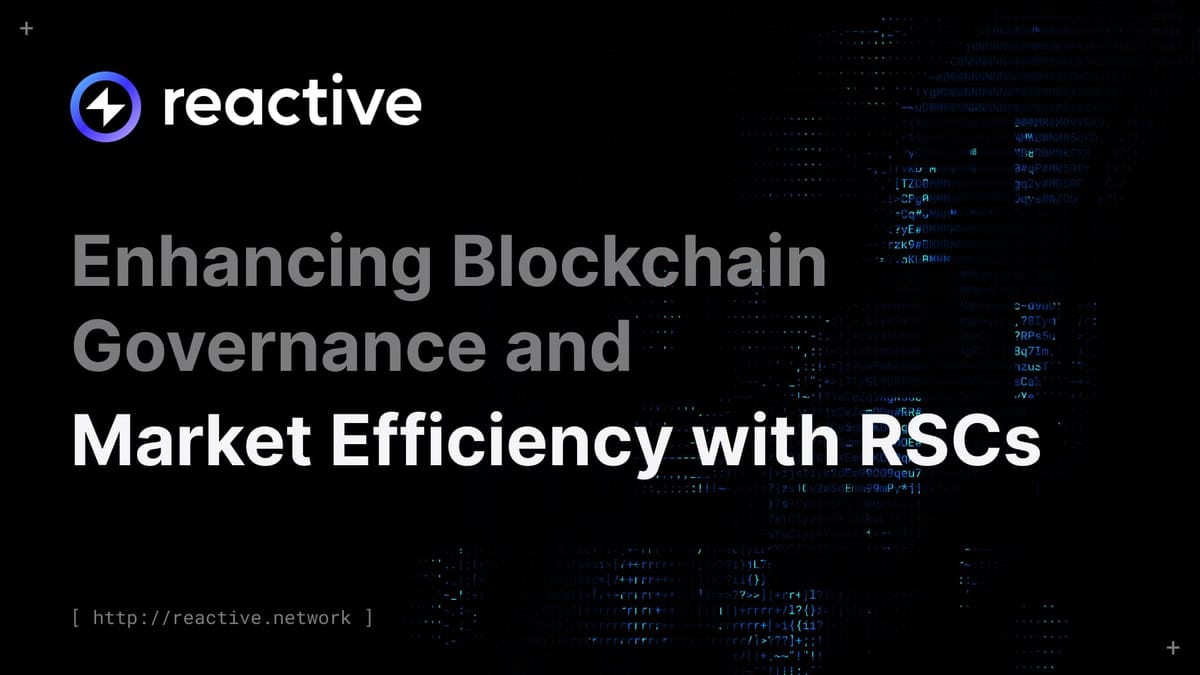Enhancing Blockchain Governance and Market Efficiency with Reactive Smart Contracts: Part 2

In the first article of our Reactive use case series, we discussed Cross-Chain Oracle, Automated Token Buyback and Burn, and Automated One-Step Swap. In case you missed it, feel free to review the first part to brush up on details.
The second part explores another three Reactive use cases that can be implemented today: Automated Governance, Cross-Chain Governance, and Automated Prediction Markets. Reactive Smart Contracts improve blockchain functionality by synchronizing governance actions across chains, automating the execution of governance decisions, and ensuring fast, accurate payouts in prediction markets, thus addressing current limitations and improving efficiency.
Automated Governance
– automated execution of governance decisions based on voting results or time limits.
Problem
The existing process involves people taking turns voting, and after the final vote is cast, the admin or responsible person manually executes the decision. This approach has a significant disadvantage: the dependency on the dApp admin to manually trigger execution can lead to delays (a block or more) and errors.
Alternatively, the execution of the decision can be tied to the last vote, which means the last voter incurs the gas cost. However, this method is unfair as it places an undue financial burden on the final participant.
Reactive Solution
Reactive Smart Contracts can monitor votes and automatically execute decisions upon reaching the required threshold, all in a decentralized manner. This process eliminates the need for manual intervention, guaranteeing that no single entity controls the execution. Once a proposal is approved by a vote, it can be executed automatically without further human input, and without relying on a centralized script holding private keys.
Cross-Chain Governance
– automated governance processes across various chains.
Problem
Governance smart contracts deployed on multiple chains, such as Ethereum and Polygon, are not yet synchronized to facilitate decision-making and execution in multi-chain setups. Ideally, a cross-chain governance system would allow people to vote on different chains, ensuring that all votes are accounted for, regardless of the chain they are cast on.
Reactive Solution
Reactive Smart Contracts (RSCs) can solve this problem by synchronizing vote counts across multiple chains. These contracts can automatically trigger corresponding processes on other chains, minimizing delays and preventing inconsistencies. Additionally, incorporating automated governance on top of cross-chain governance would allow RSCs to execute decisions automatically once the voting threshold is reached, forming a cohesive governance system.
Automated Prediction Market
– a prediction market with automated payouts.
Problem
Currently, prediction market payouts rely on manual or bot intervention. Automating these payouts would provide a quick and accurate distribution of rewards based on event outcomes, thereby increasing participant trust and engagement through immediate compensation for correct predictions. This change would greatly improve the overall user experience of the platform.
In contrast, manual handling of prediction market outcomes can be slow and error-prone. Delays in verifying results and distributing rewards can lead to participant frustration and decreased confidence in the platform’s fairness and efficiency.
Reactive Solution
Reactive Smart Contracts can automate the entire process of a prediction market. They could verify the outcomes using oracle data and trigger automatic payouts to participants based on the results so that the rewards would be distributed accurately and fast, without the risk of human error.
Conclusion
By implementing Reactive Smart Contracts for automated governance, cross-chain governance, and automated prediction markets, we resolve current inefficiencies and build on overall blockchain functionality. These solutions aid DAO members, multi-chain project teams, and prediction market participants by synchronizing actions, minimizing manual tasks, and delivering timely, accurate rewards. As a result, user experience and trust in decentralized systems increase significantly.
Stay tuned for more gripping use cases revealing the potential of Reactive Smart Contracts! For those interested in bringing any of these use cases to life, we welcome you to join our Hackathon and bounty program.
About Reactive Network
The Reactive Network, pioneered by PARSIQ, ushers in a new wave of blockchain innovation through its Reactive Smart Contracts (RSCs). These advanced contracts can autonomously execute based on specific on-chain events, eliminating the need for off-chain computation and heralding a seamless cross-chain ecosystem vital for Web3’s growth.
Central to this breakthrough is the Inversion of Control (IoC) framework, which redefines smart contracts and decentralized applications (DApps) by imbuing them with unparalleled autonomy, efficiency, and interactivity. By marrying RSCs with IoC, Reactive Network is setting the stage for a transformative blockchain era, characterized by enhanced interoperability and the robust, user-friendly foundation Web3 demands.





